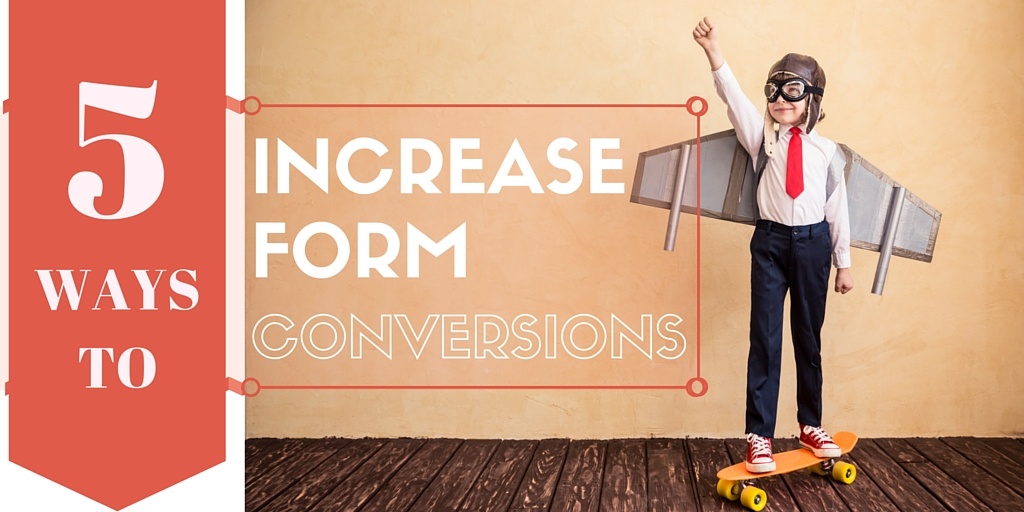 Nathan Yerian
Nathan Yerian
Forms are the lifeblood of your leads and when improperly optimized, conversion rates will fall faster than Myspace after Facebook. Why? Because forms are a point of friction on your site.

Forms are the area where your target audience stop and ask, “Do I really want to hand over my contact information?” That being said, improving your forms can mean big opportunities for your company. So the question remains, why not take the time and improve the performance of your forms and reduce the friction?
By implementing the five points below, you can increase your conversion rates. As a bonus, you will also spare countless visitors the agony of encountering another atrocious form they would be dreading to complete.
1. Design To Stand Out
Today we are constantly connected to the digital realm where we read, digest, and move on all in a short time. The same can be said about online forms, which are notoriously missed or avoided if they fail to capture the attention of the user. If you are looking increase your submission rate, use a clean form design that captivates and helps guide the user in the visually in the direction of the submit button.
Here are a few other things to think about when creating a form that wows users into handing over their contact information:
-
Ensure all form designs are consistent with your brand
-
Avoid creating two columns within your forms
-
Get creative with the field text
-
Keep your form simple and reduce the need to scroll drop down options.
2. Select Form Titles Carefully
Would you fill out a form if the title was confusing or non-existent? After all, the title indicates exactly what users will receive after giving you their contact information. This is why your title should be clear, striking and concise. Imagine your form title is a call to action and it’s sole purpose is to encourage visitors to complete the form in its entirety and continue to participate in the digital journey.
Here are a few examples of form titles that is both recognizable and encourages action:
-
Sign up for the weekly blog digest
-
Claim your Big Data is Baloney whitepaper
-
Register for Why Cat Videos Dominate YouTube webinar
-
Download your Social Media Marketing ROI Guide
3. Goldilocks Your Field Count
Keeping forms short to increase conversions is wise and can help prevent form abandonment. However, a short form can be just as off-putting as a long one and even get you into hot porridge with sales if the leads aren’t top quality. So what’s the right number of fields?
There isn’t a definitive answer but with a strong strategy and keeping these points in mind, you can find your perfect form field count that isn’t too big or small but just right:
-
Steer clear of invasive questions like asking for their age, if possible (reduces conversion rate by 3%) or phone number (reduces conversion rate by 5%).
-
Experiment with optional fields. Studies show companies who added the word ‘optional’ to phone field doubled conversion rate from 42.6 to 80%.
-
Automate fields when possible using smart form logic. If the information is already in your system, it should be populated automatically.
-
Consider the buying stage of your offer and match it to how much information you need. A whitepaper shouldn’t require the same information as an infographic.
4. Don’t Submit to “Submit”
For the love of conversions, make sure the submit button does not actually say “submit.” Just imagine bumping the conversion rate by 3% with a few minutes of brainstorming and non-intimidating copy that addresses the viewer as a peer. Think of this button as the last opportunity to convince the user to continue filling out the contact fields and take the next action. Finally, make sure the button is customized to reflect the offer.
Here are a few examples:
-
Get The Information
-
Show Me My Coupon
-
Download This eBook
-
Find My Apartment
5. A/B Test For Success
Any area on your website that could potentially create friction on a website is open for A/B testing, your forms included. By A/B testing your forms, you can get a better handle on your target audience’s behavior when asked to provide personal information. An even bigger benefit to testing different versions of your form is increasing the conversion rates down the line with other forms and in half of the time.
If you’re unsure what to test, try these ideas:
-
Experiment with multiple forms of copy that highlight what the user will get after submitting the form
-
Try multiple “submit” button versions that hint at what happens after the click
-
Test multiple brand consistent colors that will help find the eye pleasing recipe for success
-
Try different field copy that is no where near the traditional “First Name, Last Name, E-mail.”
Reducing your website forms friction means improving the user experience and making the journey purposeful. Whether you are A/B testing, designing to stand out or optimizing your form titles, strategies like these will assist in reducing the friction that makes users abandon forms.
By making the experience as easy and sensible, you’ll find that conversions and user experience will both significantly improve. Within each form on your website are hidden submissions and opportunities waiting for you to uncover.


